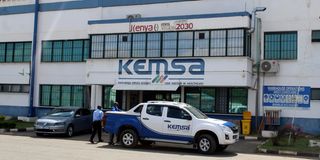Kemsa graft prosecutions fail to start 16 months on

The Kenya Medical Supplies Authority (Kemsa) offices in Nairobi.
What you need to know:
- The Sh7.8 billion scandal was a well-crafted scheme where officials took advantage of the pandemic.
- The investigations into the scandal ordered by President Uhuru Kenyatta have turned out to be a circus.
Sixteen months after the suspension of Kenya Medical Supplies Authority (Kemsa) officials, no prosecution has been carried out and a Parliament report has not been adopted.
The suspended officials are also still taking home half of their salaries while acting officials in the same positions are also being paid full salary with no prosecutions going on.
The officials were suspended to pave the way for investigations after they were adversely mentioned in the irregular payments relating to the purchase and supply of Covid-19 emergency equipment at the Kemsa.
Those currently in suspension include CEO Jonah Manjari alongside directors Eliud Muriithi (Commercial) and Charles Juma (Procurement).
The Sh7.8 billion scandal was a well-crafted scheme where officials took advantage of the pandemic to buy excess Covid-19 related materials at an exorbitant price.
Sixteen months later, the medical agency is in a dire financial crisis and is not able to supply hospitals with what they need, putting the lives of thousands of Kenyans at risk as they cannot access drugs in public hospitals.
The investigations into the scandal ordered by President Uhuru Kenyatta have turned out to be a circus. To date, no one has been charged in court for any offence even after Auditor-General Nancy Gathungu revealed procurement irregularities that cost taxpayers Sh7.8 billion.
One of the suspended officials who spoke to the Sunday Nation on condition of anonymity questioned why they are not being investigated if they were involved in the scandal.
“But why are we not being investigated. Why are they not taking action if indeed we messed the organisation? This is just a cover-up. They know the people they should go for let them stop these sideshows,” he said.
“I am still an employee of Kemsa until further notice. I am paid half of my salary. The government should prosecute those found culpable and let the innocent perform their duties and avoid messing with people’s careers. The war on corruption will only be won with utmost objective and integrity.”
Covid millionaires
In August last year, President Kenyatta gave investigative agencies 21 days to bring masterminds of the “Covid millionaires” scandal to book.
In October, Director of Public Prosecutions (DPP) Noordin Haji returned the inquiry files to the Ethics and Anti-Corruption Commission (EACC) with claims that there were gaps identified in the inquiry.
Contacted, EACC spokesperson Yassin Amaro could not confirm the status of the file and whether the concerns the DPP raised had been addressed by the ethics.
“I can’t tell you the exact things we were told to tie up because those are matters of the investigators. They are technicalities meant for courts,” Mr Yassin told the Sunday Nation.
In Parliament, the report produced by MPs has not been debated.
Public Investments Committee (PIC) chairman Abdulswamad Nassir said he had consulted Speaker Justin Muturi who promised him that the report would be scheduled soon for debate and adoption by the house.
“Our report is very clear on who to prosecute, who should not hold public office, who should be investigated by the investigative agencies and who should not be paid,” Mr Nassir told the Sunday Nation.
“I reliably informed that the investigative agencies are already acting on our report,” he added.
Without the house acting on the report, it means that the investigative agencies cannot act on it yet as it does not have the force of law.
The Auditor-General’s office in September last year in a report tabled before the Senate revealed that Kemsa procured Covid-19 related items at a higher price setting the stage for investigations into the loss of public funds.
However, for anyone to be held responsible for the irregularities, the agencies charged with the investigations had to make their recommendations.
The office of the Director of Public Prosecutions and that of the EACC are yet to finalise their investigations.






